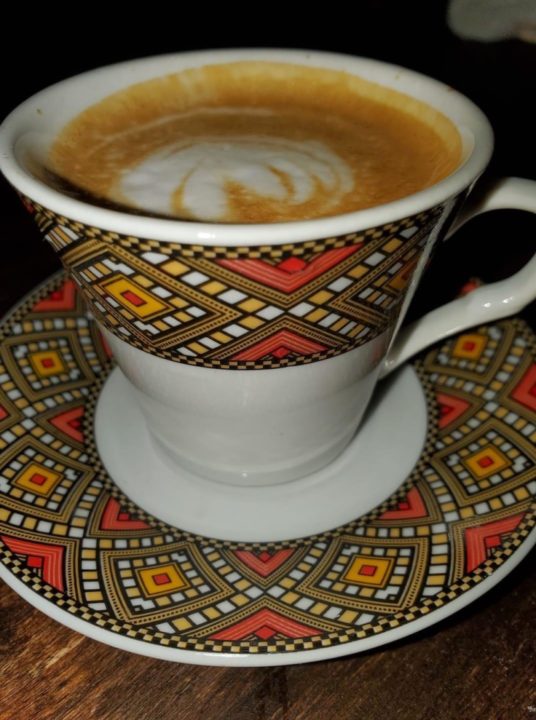The Local newsletter is your free, daily guide to life in Colorado. For locals, by locals.
At 2 p.m. every Sunday afternoon at Whittier Cafe off Humboldt and East 25th streets, incense is burned, coffee is brewed in clay pots called jebenas, and bowls of popcorn are shared at a weekly coffee ceremony. As a part of the traditional Ethiopian gathering, hosts produce a concentrated brew similar to espresso, with a deep richness and subtle sweetness that cuts through the beans’ typically bitter notes. Small shots of the steaming beverage are served to a bustling group of patrons from all around the neighboring community.

The weekly ceremony—a tradition in cafe owner Millete Birhanemaskel’s birthplace of Tigray, Ethiopia—is just one example of her efforts to encourage connection and provide a safe space where all patrons feel welcome in the Whittier neighborhood. Upon Whittier Cafe’s opening in the historically Black community of the same name in 2014, it soon became a hub for social activism—a place for people to organize, recite political poetry, and discuss local and national issues.

“[2014] was a terrible summer related to police brutality, so it seemed like a lot of those gatherings were happening here on our patio,” Birhanemaskel says. “Ever since then, we became that landing place. Whenever something crazy and unfair would happen and there was nowhere else to go, people would come to Whittier.”
While the pandemic and racial reckoning in 2020 brought a particularly high influx of customers who were dedicated to supporting Black-owned business and social justice, Birhanemaskel notes that in the last few years people have become less intentional about where they spend their money. This comes alongside increasing pressures of gentrification and property landlord issues in Denver, making it difficult for Black-owned businesses in the neighborhood and across the city to survive.
“We’re one of the last women standing, so what happens if we go? We’re losing so much character in the community,” Birhanemaskel says. “For sure, people are less intentional. I don’t know if we just have shorter memories or if there’s so much pain that it’s hard to prioritize or figure out. It’s hard.”
Birhanemaskel uses her job as a realtor to help fund the cafe, pouring her commissions from selling a house into payroll, the space’s renovations, and for buying equipment like espresso machines. In addition to the same staffing and inflation issues as other small businesses across the service industry, during the pandemic many Black-owned businesses experienced difficulty receiving funds from the city and state, and many of those businesses closed their doors as a result.
Whittier Cafe received financial assistance from Black Resilience in Colorado Fund, a community movement that formed to save Black businesses during the pandemic, which were already operating at a lower level even in normal times. Birhanemaskel attributes acts of community support like these to helping her business survive.

The neighborhood cafe has a very loyal group of regular customers, some of whom will commute past 15 coffee shops to get their morning brew from Whittier. While a common aspect of gentrification in city neighborhoods like Whittier is the replacement of homes or existing businesses with new coffee shops, Birhanemaskel commits herself to serving robust coffee exclusively from African countries and educates her customers about the source of their cup of joe.
“I’m from Tigray, the northern region of Ethiopia, and coffee is very much a part of the culture—coffee trees grow in your backyard kind of thing,” Birhanemaskel says. “A lot of people don’t know how beans are grown, and they grow on trees essentially and how you pull them and they look like cherries, and the whole drying process. All of that—that’s like a normal thing where we grow up in coffee-producing countries.”
To bolster knowledge, Birhanemaskel points to photo displays on the walls that feature snapshots of the coffee cherries as they move through the transformative production process. Events like the Ethiopian coffee ceremony also help share the ritual and importance of coffee in her communal culture—aspects of which she strives to bring to Whittier Cafe each day.
Whittier Cafe is open seven days a week, and offers a full coffee menu as well as breakfast burritos, cookies and pastries, African beer and wine, and a variety of smoothies (including an almond breakfast smoothie made with dates, almond butter, and almond milk—to which you can add a shot of espresso for an extra boost). Whittier exclusively sources its coffee beans from African countries, including Rwanda and Kenya. Currently, the cafe is boycotting Ethiopian coffee due to continuing political injustices and genocide in Tigray.
1710 E. 25th Ave.








